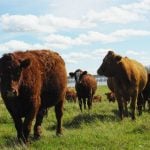Glacier FarmMedia | MarketsFarm – The following is a glance at the news moving markets in Canada and globally.
– Statistics Canada reported on Thursday that retail sales decreased 1.1 per cent at C$69.2 billion in May, largely due to a 3.6 per cent decline at motor vehicle and parts dealers, as well as a 4.6 per cent drop in sales at new car dealers. Core retail sales, which exclude gasoline stations and fuel vendors and motor vehicle and parts dealers, were relatively unchanged in May. However, sales at building material and garden equipment and supplies dealers rose 1.9 per cent. StatCan also estimated a 1.6 per cent increase in June.
Read Also
Global Markets: Alberta proposes new pipeline
Glacier FarmMedia – The following is a glance at the news moving markets in Canada and globally. – The…
– The European Union and the United States are working towards a new deal which would place a 15 per cent baseline tariff on EU goods entering the U.S., two EU diplomats said on Wednesday. The rate could extend to cars and there could be concessions on aircraft, lumber, medicine and agricultural products. However, the U.S. is unlikely to reduce its 50 per cent tariff on EU steel. Trump administration trade adviser Peter Navarro told Bloomberg News the report from the EU should be taken with “a grain of salt.”
– Reuters reported on Thursday that China and Australia are close to an agreement in which China would grant access to Australian canola, which has been banned since 2020. China will allow Australia to ship five cargoes on a trial basis. Australia exported 500 tonnes of canola to China, also on a trial basis, in June and July of last year.
– Australia’s ag department confirmed on Thursday it will lift a ban on beef imports processed in the U.S., but raised in Canada and Mexico. U.S. Agriculture Secretary Brooke Rollins congratulated President Donald Trump on the new agreement, but Australia’s ag minister Julie Collins claimed the decision was unrelated to Trump’s trade war. A ban on beef from cows raised and slaughtered in the U.S. was lifted in 2019 but restrictions remained on beef from cattle raised in Canada and Mexico. U.S. beef exports to Australia are minimal as nearly 99 per cent of all beef sold there are domestically raised and processed, according to Meat & Livestock Australia.









